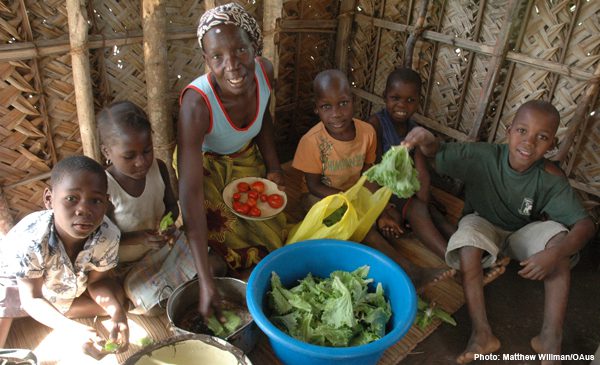
Ecerina Adolfo Nhamtumbo is from Inhambane Province, Mozambique. She lives in Quene village, where she looks after two of her children and six of her orphaned grandchildren. But feeding eight mouths is no easy feat when your garden soil has turned to sand.
This is reality for Ecerina and her neighbours. Years of drought have changed Mozambique’s climate, making it difficult to grow crops in the arid, sandy soil.
We’ve been working with local partner organisations to help people in Ecerina’s village adapt to this changed climate.
Oxfam News Editor Maureen Bathgate travelled to Mozambique to talk with program participants in Ecerina’s village and in other provinces where we work, about their challenges and successes in creating a new future for themselves.
Each week for the next two months we’ll feature a different voice from Mozambique. Read on for a conversation with Ecerina.
Ecerina’s story
On the way to this family we see maize crops which are dying in the fields because they didn’t get enough rain. [Local partner organisation] Mahahle is training families to plant seeds in December, instead of January, to improve yields, as the crops can profit from the earlier rains. –MB
How many people are living in your household?
Ecerina: I am caring for eight children — six are here today and another two are at school. I am their grandmother. They are the children of my three daughters. I am separated from my husband. He lives far away.
How did you come to be their carer?
Ecerina: The mother of Edson and Maida left the father and I don’t know where she is now. Their father died. Ilorca’s mother died and I don’t know where her father is. Marcos, his father died and I don’t know where his mother is.
In many poor families the parents cannot find work, so they can’t afford to raise their children. They go to South Africa to look for work and leave their children in the hands of their grandparents. –MB
What are the biggest challenges you face as a family?
Ecerina: There are many challenges — being able to send the children to school, having enough food and being able to feed the children. I worry about them all the time. We sometimes have to go many days without eating anything. It is very hard.
How do you go about getting food to eat?
Ecerina: I have a small farm where I grow things for us to eat.
I usually go to work for another farm to get food or to buy materials and uniforms for the children for school.
What types of crops do you grow?
Ecerina: Before the project I was growing cassava, beans and maize. The maize does not grow well. The soil is poor and we haven’t got enough rain. The crops just die. But I still plant. I still attempt to grow it. I must try in case we get something.
Mahahle has found that some crops are resistant to drought, but maize isn’t. Low rainfall seriously affects crops, and so they are experimenting in changing the time of planting to take greater advantage of rainfalls. –MB
How does Mahahle support you and your family?
Ecerina: The project is helping me to grow different types of crops. I received vegetable seeds and I am now growing many different vegetables — cabbages, onions, lettuce and tomatoes. I have just harvested my first crop of tomatoes and lettuces. I have never grown them before. I am very proud that I grew them myself.
I received some pineapple seedlings that are suited to the dry conditions here. They are just starting to grow now … I have never grown pineapples before. One day, I hope to have a big pineapple patch.
I have learned new techniques for planting, so I can grow better crops. I learned grafting, so I can grow good quality fruit. I was also trained in food processing, techniques to make the food that I grow last longer and I also learned how to vaccinate chickens.
I have also received food from the project like maize and beans, plus school materials such as exercise books and pens, so the children could go to school. Mahahle helped me to register the children for birth certificates and ID papers.
What are the main differences the project has made for your family?
Ecerina: The main change is that I have learned better ways to grow things, from seedlings and I have learned how to process food to make it last longer. It means we have more food to eat and the children can be healthier.
For a long time the children couldn’t go to school because I couldn’t afford the materials. But the project helped us. They help three of my children go to school.
There has been a school council formed by community members. Mahahle helped the community form this council. Mahahle has also helped the community set up a seed fund. The project provides seed to the community and families must pay money to the fund to get seeds. The community uses this fund to pay if anything bad happens. –MB
This conversation with Ecerina took place in 2009. In January 2011 we went back to Ecerina’s village to see how she was doing. Read on for more of Ecerina’s story!
(Want to help make a difference? Donate to our Stop Hunger appeal and support our work with communities like Ecerina’s.)